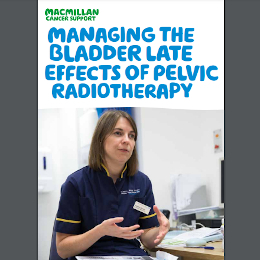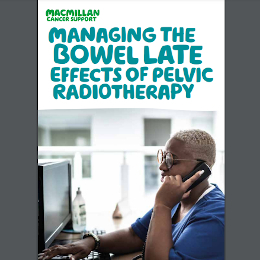Late effects of pelvic radiotherapy
Late effects are side effects that do not go away, or that start months or years after pelvic radiotherapy.
On this page
-
About pelvic radiotherapy late effects
-
If you have late effects
-
Bladder problems after pelvic radiotherapy
-
Bowel problems after pelvic radiotherapy
-
Tiredness after pelvic radiotherapy
-
Sex and late effects of pelvic radiotherapy
-
Fertility after pelvic radiotherapy
-
Lymphoedema after pelvic radiotherapy
-
Bone changes after pelvic radiotherapy
-
Early menopause after pelvic radiotherapy
-
Nerve changes after pelvic radiotherapy
-
Second cancer after pelvic radiotherapy
-
Other types of expert help
-
About our information
-
How we can help
About pelvic radiotherapy late effects
Most people have side effects during pelvic radiotherapy. Usually, these side effects gradually improve over a few weeks or months after treatment has ended.
Sometimes side effects do not go away, or they start months or years after treatment has ended.
These side effects are called:
- long-term effects – if they begin during treatment, or shortly after treatment has ended, and last longer than 3 months
- late effects – if they begin months or even years later, as a delayed response to treatment.
In this information we use the term late effects to include both long-term and late effects. Late effects after pelvic radiotherapy may also be called pelvic radiation disease (PRD).
If you have late effects
Talk to your cancer doctor or specialist nurse if you have:
- side effects that do not go away
- new symptoms or problems after treatment has ended.
If you have problems with your bowel, bladder or sex life, you may feel embarrassed to talk about them. But doctors and nurses are used to speaking about these issues. If they know you are having problems, they can answer your questions and help you.
It can be frightening to have symptoms after treatment has finished. You may worry that the cancer has come back.
Your doctor or nurse can explain whether your symptoms may have been caused by the treatment you had. You may need tests to check for other causes.
Some late effects may not affect your daily life very much. Others can be more difficult to live with. Help and support is available, and there are usually things that can help you cope.
Bladder problems after pelvic radiotherapy
Pelvic radiotherapy can cause long-term changes in the way the bladder works. Changes may include:
-
Scarring and hardening of the bladder wall
Pelvic radiotherapy can cause the bladder to shrink. This means it cannot hold as much urine (pee) as before. This happens when the bladder walls become scarred and the tissue becomes less stretchy.
-
Weakened muscles
Radiotherapy can also weaken the pelvic floor muscles and the urethral sphincter. This makes them less effective and this can cause you to leak urine (incontinence).
-
Damaged bladder lining
Radiotherapy can damage the tissue and blood vessels in the lining of the bladder. This can cause pain or burning when you pass urine. It can also make you feel like you need to pass urine frequently (radiation cystitis). The small blood vessels in the bladder lining may become weaker and bleed easily. This can cause blood in your urine (haematuria).
-
Damaged nerves
Sometimes, radiotherapy damages the nerves near the bladder and affects how the bladder muscles work. This may mean the bladder does not empty completely. Treatment may also make the urethra narrow. This can make it more difficult to pass urine. The narrowing is called a urethral stricture.
Symptoms of bladder changes
Bladder changes can cause symptoms such as:
- needing to pass urine more often than usual (frequency)
- being unable to wait to empty your bladder (urgency)
- leaking urine (incontinence)
- a burning feeling or pain when you pass urine (cystitis)
- blood in your urine (haematuria)
- difficulty passing urine, or a feeling you still have urine left in your bladder after going to the toilet (retention)
- pain in the pelvic area.
These symptoms are similar if you have them during radiotherapy, or if they happen later on.
If you have any of these symptoms, it is important to have them checked by your doctor. Blood in the urine should always be checked by a doctor as soon as possible.
Treating bladder problems
There are lots of things that can be done to manage or treat your symptoms. Your GP can advise you, or they may need to refer you to a specialist healthcare professional. This might be a urologist, continence advisor or physiotherapist.
The right treatment for you will depend on the symptoms or side effect you have and how much of a problem they are.
We have more information about treating bladder problems and managing bladder symptoms.
Booklets and resources
Bowel problems after pelvic radiotherapy
Pelvic radiotherapy can cause long term changes to the bowel
-
Damage to the bowel lining
Radiotherapy can damage the lining of the bowel and the small blood vessels in it. This may cause bleeding from the
-
Scarring of the large bowel
Radiotherapy can also cause scarring (fibrosis) in the large bowel. This can make the bowel narrower, thicker and less flexible. Waste passes through it more quickly than before. Stools (poo) may be softer and looser, or liquid. The rectum may not be able to hold as much stool. You may go to the toilet more often and need to go more urgently.
-
Changes to the rectal muscles
Radiotherapy can also affect the muscles that help keep the stool inside the rectum. This can cause problems with bowel control and leakage of stool (bowel incontinence).
-
Small bowel changes
Sometimes radiotherapy can cause changes in the small bowel. You may become unable to digest some types of food (food intolerance). Or you may have diarrhoea and other symptoms. There are 2 types of small bowel change. Bile acid malabsorption is when the small bowel is no longer able to re-absorb bile acids used in digestion. Small bowel bacterial overgrowth is when bacteria that do not usually live in the small bowel start growing there. This is also sometimes called small intestinal bacterial overgrowth (SIBO).
Symptoms of bowel changes
Possible symptoms of late effects to the bowel include:
- bleeding from the back passage (rectum)
- passing mucus (a clear, sticky substance)
- cramps or spasms in the bowel, which may be painful
- feeling that you need to pass stools even when your bowel is empty – this is called tenesmus
- not being able to empty the bowel completely
- diarrhoea or constipation
- needing to rush to empty your bowels (urgency)
- problems controlling your bowel, causing leakage or soiling (bowel incontinence)
- passing a lot of wind, or losing control of passing wind.
Some people have mild symptoms that do not cause too many problems. They may only notice small changes, such as having to go to the toilet twice a day instead of once. For other people, bowel changes have a much bigger impact and can affect daily life. Bowel symptoms can affect your appetite or weight. Talk to your doctor if you notice that you are losing weight.
It is important that you get ongoing bowel symptoms checked by your doctor.
These symptoms might not be caused your radiotherapy treatment. They can be a sign of a more serious problem. It is important to find out the cause as soon as possible.
There are 4 symptoms you must always talk to your doctor about:
- passing blood from your back passage
- waking up from sleep to open your bowels
- needing to rush to open your bowels
- bowel incontinence.
Treating bowel problems
The right treatment for you will depend on the symptoms or side effects you have and how much of a problem they are.
We have more information about treating bowel problems and managing bowel symptoms.
Booklets and resources
Tiredness after pelvic radiotherapy
Radiotherapy usually makes people feel tired. Tiredness may get worse as treatment goes on. If you are having radiotherapy alongside other treatments, such as surgery or chemotherapy, you may feel more tired. After treatment finishes, you may continue to feel tired for weeks or months. If it does not get better, tell your cancer doctor or specialist nurse.
We have more information about coping with tiredness (fatigue).
Sex and late effects of pelvic radiotherapy
Pelvic radiotherapy can cause changes that affect your sex life. These difficulties may be temporary and gradually improve over time. But even permanent changes that affect your sex life can often be improved.
Pelvic radiotherapy may cause:
- reduced desire for sex or a low sex drive (libido)
- changes in sexual sensation
- menopausal symptoms
- vaginal changes, such as dryness, narrowing, bleeding or infections
- erection problems
- changes in ejaculation
- changes to the anus or rectum.
We have more information about coping with changes that affect your sexual well-being. This includes information about managing:
Booklets and resources
Fertility after pelvic radiotherapy
Pelvic radiotherapy may affect your ability to get pregnant or get someone pregnant (your fertility).
-
If radiotherapy affects the ovaries or womb
Radiotherapy to the pelvic area can affect the ovaries or eggs and the womb. Your risk of infertility depends on the dose of radiotherapy you have and your age. There is also a higher risk of infertility when you have chemotherapy with radiotherapy (chemoradiation). We have more information about how pelvic radiotherapy may affect your ability to get pregnant.
-
If radiotherapy affects the testicles or penis
Radiotherapy to the pelvic area can reduce sperm production, your sex drive, and your ability to get an erection (erectile dysfunction). Your risk of infertility depends on the dose and type of radiotherapy you are getting. We have more information about how pelvic radiotherapy may affect your ability to make someone pregnant.
Worrying about your fertility may seem hard when you are already coping with cancer. It can be difficult waiting to see if your fertility will return. If cancer treatment has damaged your fertility or made it made it difficult to have sex, you may have questions about having fertility treatment. It is important to get the right information and support.
We have more information about:
Lymphoedema after pelvic radiotherapy
Lymphoedema is swelling that develops because of a build-up of fluid in the body’s tissues. This happens when the lymphatic system, which normally drains the fluid away, is not working properly.
Pelvic radiotherapy sometimes causes lymphoedema in the legs, pelvic area or genitals. The swelling can develop weeks, months or even years after cancer treatment.
Lymphoedema can be managed. It is usually possible to reduce the swelling if it is diagnosed and treated early. There are also things you can do to help reduce your risk of developing lymphoedema.
The signs and symptoms of early lymphoedema include:
- swelling – you may notice your clothing or shoes feeling tighter than usual, even before you see any swelling
- changes in sensation – the affected area may feel heavy, tight, full or stiff
- skin changes – the affected area may feel tight, stretched or a thicker texture, and sometimes it can be dry, flaky, rough or scaly
- aching in the affected area.
If you have any of these symptoms, ask your doctor or specialist nurse for advice as soon as you notice them. This can help to reduce the risk of the lymphoedema getting worse.
We have more information about lymphoedema.
Bone changes after pelvic radiotherapy
Radiotherapy to the pelvis can sometimes cause changes to the bones in this area. The changes can mean the pelvis cannot cope with the normal stresses put on it. This may increase the risk of small cracks or fractures. Doctors call these pelvic insufficiency fractures (PIFs).
Pelvic radiotherapy may also cause an early menopause if the ovaries are affected. This increases the risk of bone thinning (osteoporosis).
Talk to your cancer doctor, specialist nurse or GP:
- if you have pain or aching in the bones - this can be caused by lots of conditions, but it is very important to get it checked
. - if you think you are at risk of weak bones.
You may need tests to check your bone health. We have more information about bone health. This includes information about looking after your bones and treatments that can help protect your bones.
Early menopause after pelvic radiotherapy
Pelvic radiotherapy can affect the way the ovaries work and cause an early menopause. This means the ovaries gradually stop producing the hormones oestrogen and progesterone. Monthly periods will gradually stop and you will not be able to get pregnant. You may get symptoms of the menopause such as:
- hot flushes and sweats
- vaginal dryness
- loss of interest in sex
- difficulty sleeping
- needing to pass urine more often
- weight gain
- mood swings
- loss of confidence
- poor concentration.
Menopause can also increase your risk of other health problems including bone thinning and heart disease.
There are different ways of managing menopausal symptoms. There are also ways to reduce your risk of other health problems. We have more information about menopausal symptoms after cancer treatment.
Nerve changes after pelvic radiotherapy
Second cancer after pelvic radiotherapy
Having pelvic radiotherapy may slightly increase your risk of developing a new cancer in the treated area. But the benefit of having pelvic radiotherapy outweighs the risk. Your doctor or nurse can explain this.
Related pages
Other types of expert help
Some people with late effects need help from other specialists. Your doctor or nurse can refer you to a specialist if needed. For example, you may see the following:
- a gastroenterologist – a doctor who treats problems with the digestive system
- a colorectal surgeon – a doctor who does operations (surgery) on the large bowel
- a urologist – a doctor who treats problems with the kidneys, bladder and male reproductive system
- a gynaecologist – a doctor who treats problems with the female reproductive system
- a continence advisor – a specialist nurse or physiotherapist who gives advice and support to people with continence problems
- a doctor or nurse who treats late effects.
A few hospitals have clinics for people with late effects. Ask your healthcare team whether there are any near you. The Pelvic Radiation Disease Association may also be able to help you contact specialists.
For more information about the help available, contact the Macmillan Support Line free on 0808 808 00 00.
About our information
-
References
Below is a sample of the sources used in our pelvic radiotherapy information. If you would like more information about the sources we use, please contact us at cancerinformationteam@macmillan.org.uk
Andreyev HJN, Muls AC, Norton C, et al. Guidance: The practical management of the gastrointestinal symptoms of pelvic radiation disease. Frontline Gastroenterology, 2015; 6, 53-72.
Dilalla V, Chaput G, Williams T and Sultanem K. Radiotherapy side effects: integrating a survivorship clinical lens to better serve patients. Current Oncology, 2020; 27, 2, 107-112.
The Royal College of Radiologists. Radiotherapy dose fractionation. Third edition. 2019. Available from: www.rcr.ac.uk/system/files/publication/field_publication_files/brfo193_radiotherapy_dose_fractionation_third-edition.pdf [accessed March 2021].
-
Reviewers
This information has been written, revised and edited by Macmillan Cancer Support’s Cancer Information Development team. It has been reviewed by expert medical and health professionals and people living with cancer. It has been approved by Chief Medical Editor, Professor Tim Iveson, Consultant Medical Oncologist.
Our cancer information has been awarded the PIF TICK. Created by the Patient Information Forum, this quality mark shows we meet PIF’s 10 criteria for trustworthy health information.
Date reviewed

Our cancer information meets the PIF TICK quality mark.
This means it is easy to use, up-to-date and based on the latest evidence. Learn more about how we produce our information.
How we can help






